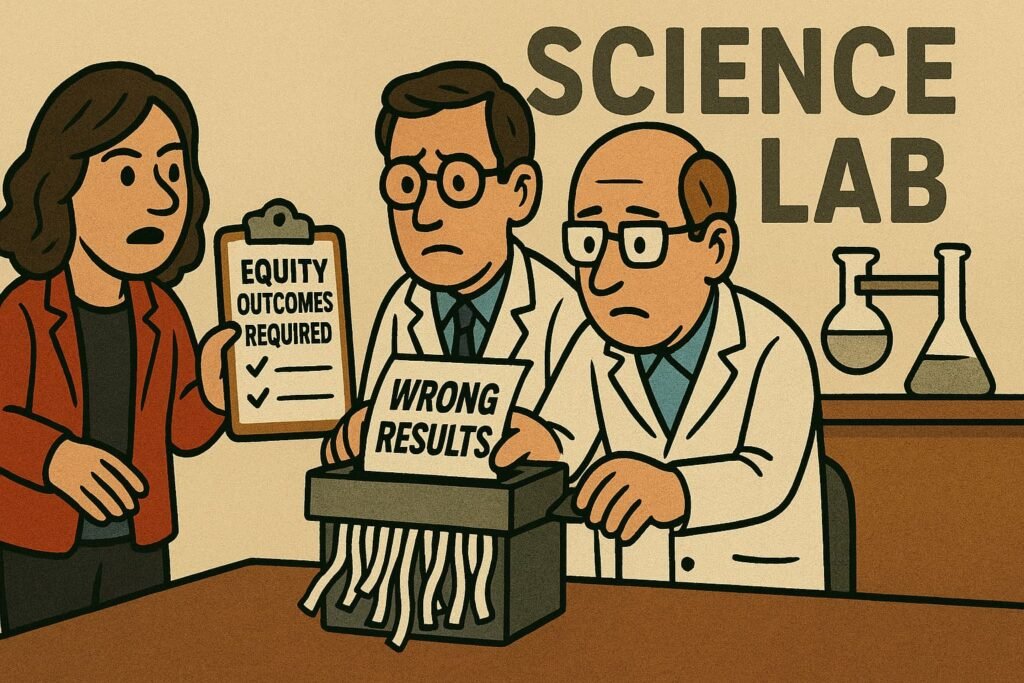Research Justice – When Activism Replaces Evidence
Once, research meant following the evidence wherever it led. Now, in the world of research justice, evidence is expected to serve activism. If the facts don’t fit the ideology, the facts are dismissed.
It sounds like fairness — “giving voice to marginalised perspectives.” In practice, it means cherry-picking results to match political goals, and branding anything else as “biased” or “harmful.”
Table of contents
Buzzword Breakdown
- Research Justice → Findings that confirm the activist script are “valid,” others are “oppressive.”
- Community Knowledge → Anecdotes rebranded as data.
- Lived Experience → A personal story elevated above empirical study.
- Equity in Research → Engineering conclusions for representation, not truth.
What Research Justice Really Means
Research justice argues that traditional science and scholarship are “dominated” by privileged perspectives. To fix this, activists demand a shift:
- Prioritise marginalised voices.
- Treat stories as equal (or superior) to data.
- Judge research by whether it produces “equitable outcomes.”
It’s not about discovering reality. It’s about enforcing ideology.
How It Works in Practice
- Universities → Grants and promotions tied to “equitable research practices.”
- NGOs → Fund only projects that support their campaigns.
- Media → Amplify studies that confirm activist talking points, bury the rest.
- Policy → Governments use activist-approved research as a shortcut to legislation.
The Business of Research Justice
Research justice creates a market for compliance:
- Consultants train academics on “inclusive research methods.”
- Funding bodies reward projects that meet equity quotas.
- Publishers push studies that fit ideological expectations.
The result: research becomes PR for activism.
The Irony
Research justice claims to broaden knowledge. Instead, it narrows it to whatever serves the agenda.
When “truth” is measured by social impact, not evidence, you don’t get justice — you get propaganda dressed up as scholarship.
Why It Matters
- Erodes trust — science starts to look like politics in a lab coat.
- Silences dissent — findings that contradict ideology are branded “harmful.”
- Weakens progress — innovation suffers when facts must pass through an activist filter.
Conclusion
Research justice turns scholarship into activism, and evidence into a loyalty test. What was once about discovering truth has been repurposed to confirm dogma.
In the end, it doesn’t produce justice — just bias with academic branding.
FAQ
Isn’t research justice just fairness in science?
No — it replaces objectivity with activism.
Who decides what counts as just research?
Usually funding bodies, activist committees, or DEI offices. See: NGOs & Activism – The Business of Selling Justice.
How do universities enforce research justice?
Through grants, peer review bias, and equity quotas. See: Universities – The Factory of Woke Graduates.
Does research justice improve knowledge?
It narrows it, by privileging ideology over evidence.
Why link it to Critical Theory?
Because Critical Theory insists all knowledge is socially constructed. See: Critical Theory – The Blueprint for Woke Politics.
👉 “For a deeper look at how Critical Theory set the stage for ideas like research justice, see our Critical Theory Explainer Hub.”



